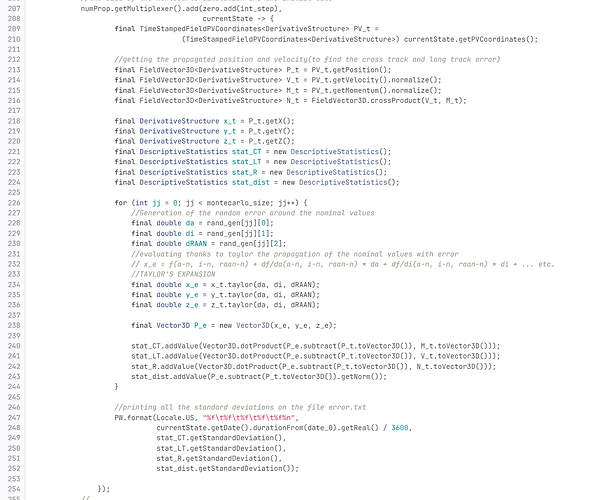I am a python user. In the process of implementing the original Java version of the program in python, I encountered this code. I am not sure how to implement it in python.The key is the “currentState → {” in the middle.
Hi @chu1995,
This is an implementation of the interface FieldOrekitFixedStepHandler, using a lambda function in Java. The overridden method is the handleStep method .
I believe you cannot do that with lambdas in Python, you’ll have to write the class. There’s an example by Petrus Hyvonen here.
In your case, you’ll have to define a class inheriting from PythonFieldOrekitFixedStepHandler.
Cheers,
Maxime
Thank you for your answer. I carefully studied the code at the location you specified, but I didn’t understand it. I hope you can provide more detailed guidance. I have been stuck at this location for a long time. ![]()
Hi again @chu1995,
Before:
numProp.getMultiplexer().add(zero.add(int_step),
currentState -> {...
You need, in Python, to define a class inheriting from PythonFieldOrekitFixedStepHandler:
class MyFixedHandler(PythonFieldOrekitFixedStepHandler):
def init(self, s0, t, step): # All native defined calls needs to be implemented
pass
def handleStep(self, currentState):
# Here you need to translate in Python the code of the Java handler
def finish(self, s):
pass
In method handleStep you need to translate in Python the code of the Java handler.
Starting with:
final TimeStampedFieldPVCoordinates<DerivativeStructure> PV_t =
And finishing with
//printing all the standard deviations on the file error.txt
PW.format(Locale.US, "%f\t%f\t%f\t%f\t%f%n",
currentState.getDate().durationFrom(date_0).getReal() / 3600,
stat_CT.getStandardDeviation(),
stat_LT.getStandardDeviation(),
stat_R.getStandardDeviation(),
stat_dist.getStandardDeviation());
});
Then, you will be able to write:
numProp.getMultiplexer().add(zero.add(int_step), MyFixedHandler()
This should reproduce the Java behavior you didn’t understand.
Cheers,
Maxime
Thanks for your answer, it helped me learn a new skill!!!
